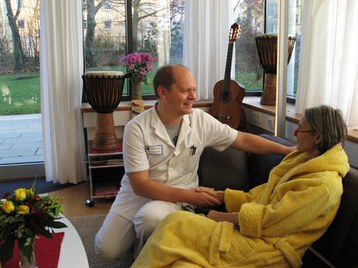Films as a Teaching Aid
Freiburg, Mar 06, 2017
Borderline situations are an everyday occurrence in palliative care units. How can students learn to deal with them? A new teaching approach combines lectures and seminars with e-learning modules that replace some of the traditional on-campus learning. The online module features films including interviews with patients as well as doctors, nurses, psychologists, and ministers.
Borderline situations are an everyday occurrence in the Department of Palliative Care at the University of Freiburg Medical Center. Even though two-thirds of the patients in palliative care units are eventually released, the professionals caring for them need to be versed in topics like the finitude of life, anxieties, and uncertainties. Easing patients’ physical pain is only a part of their job; they also need to tend to their psychosocial and spiritual needs.

Photo: Medical Center – University of Freiburg, Department of Palliative Care
The task of getting students to appreciate these special circumstances presents educators with a host of challenges. For one thing, there are logistic limits: “We have ten beds and around 350 students,” says Prof. Dr. Gerhild Becker, medical director of the Department of Palliative Care. This statistic alone already illustrates the limits of bedside teaching. In addition, there are scheduling constraints: “The people are very sick, so it is always difficult to foresee when a patient will be capable of speaking with students.” Consideration for the patients is always top priority at palliative care units, but the tight schedules of medical students leave no room for on-call patient visits.
Tour through the Unit
Gerhild Becker and the educational scientist Bettina Couné developed a teaching approach in the 2015/16 winter semester with an eye to remedying this difficult situation. It combines lectures and seminars with e-learning modules designed to replace some of the traditional on-campus learning. The online module features film sequences including interviews with patients, doctors, and other professionals engaged in palliative care. In the introductory film, a student takes a guided tour of the palliative care unit with assistant medical director Dr. Karin Jaroslawski. The student asks questions that are important for her – and by extension also for the viewer of the film – and the assistant medical director answers them. Another film shows a team meeting involving discussions about each and every patient. Discussions like these are a critical aspect of work in palliative care units, where doctors, physical therapists, psychologists, and ministers all need to work together to achieve the best for the patients. The only way to do so is by communicating with each other. The films give the students important insight into work procedures at the Department of Palliative Care.
Films featuring patients talking about their experiences play a special role in the program. “The patients are the experts on their experience, the doctor the novice,” says Becker. On account of their illness, only few patients are capable of describing this experience, and even those who are cannot usually do it upon request while students are visiting the unit. These films are thus a valuable resource for the students.
Passing on Valuable Information
In one film, a patient with amyotrophic lateral sclerosis (ALS), a disease of the nervous system, describes her personal experience. Her speech faculties were already greatly compromised at the time of filming. It thus took a lot of time to record the film – time students do not have during bedside teaching sessions. And yet it is precisely these patients who can pass on valuable information to the students. What the ALS patient found worst was the experience of not being understood. “It is a profound feeling of incapacitation,” explains Becker. This is painful for many patients, for instance because people start doing things for them that they are actually still capable of doing on their own. “In this case we were lucky to find a patient for the film who was capable of communicating this experience in an easily understandable way for the students,” stresses Becker. That is not always the case with bedside teaching.
Another film treats a further important aspect of daily work in palliative care units: doctor’s rounds. The film shows how important it is in palliative care for caregivers to treat patients as equals and as individuals. The doctor sits down at the patient’s bedside and listens to him. The head physician does not simply burst into the room with her entourage and speak about the patient. She speaks with the patient.
Learning How to Endure Slowness
Medical students are required to take two units of palliative medicine, one in their first semester and the other in their fifth semester of study. The program begins with an introductory lecture course, followed by the e-learning module and an on-campus seminar. The videos are part of the e-learning module. “The films give the students a chance to learn at several different levels,” says Becker. They learn on the basis of a model, working on a concrete topic and at the same time learning about the importance of their own inner attitude when talking with people suffering from a severe illness. Gerhild Becker also cites other advantages: “Today’s students are used to interacting at a much faster pace due to modern media. The ALS patient gives them a feel for how much time things can take. They need to learn how to endure slowness.”

Treating patients as equals: Films show students what it’s like to work at a palliative care unit. Photo: Medical Center – University of Freiburg, Department of Palliative Care
This form of learning can be a strain for students, because it forces them to confront the topics of suffering and death, while they are interested above all in helping and healing. “Some of the students told us they found it difficult to work through all this on their own,” says Couné. That is a good thing in a sense, because the students need to find out whether they are up to the task of providing palliative care. All of the students have to take a multiple-choice test at the end of the online module. “This is important, because we need to check whether the students have acquired the necessary knowledge for the seminar,” says Couné.
Reporting from Daily Work Experience
“On the whole, it is of course important to not leave the students alone with what they learn watching the films,” sums up the educational scientist. The seminar the students take upon completing the e-learning module thus gives the students a chance to reflect on and sort out what they have learned through self-study. Karin Jaroslawski attends the seminar too. “You might say she reports directly from daily work experience,” says Becker. The experienced doctor responds to burning issues raised by the films and gives students the opportunity to come into direct contact with patients.
The films are produced by a small team led by the media technologist Matthias Weis. “We try to keep the technology as unobtrusive as we can,” says Becker, the idea being to place the patients under as little additional strain as possible. This means putting up with minor technical shortcomings like background noise that cannot be edited out even through careful editing. The team usually films a lot more footage than can ultimately be integrated into the online modules. “Basically, the films get right to the core of an issue the students spend a lot of time thinking about,” says Becker. Another positive effect of the films is that the patients find it beneficial to talk about their situation and thus to contribute to the education of aspiring young doctors.
Petra Völzing
www.palliativecare.uni-freiburg.de

